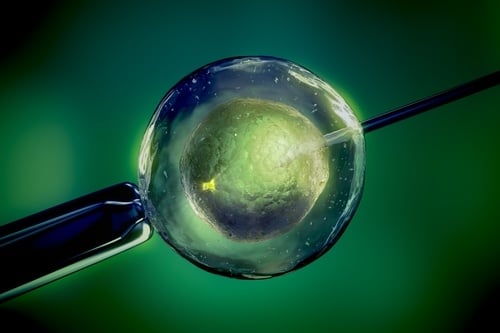Fertility drugs have played a vital role in millions of successful pregnancies, and are an indispensable part of modern fertility treatment. For most patients seeking medical help with their fertility, chances are high that they will encounter one or more fertility medications over the course of their treatment. At times, these drugs are used on their own, as a non-surgical fertility treatment, or they can be used in conjunction with intrauterine insemination (IUI). They are also used as a part of in vitro fertilization (IVF).
SCRC Contributor
Recent Posts
How to Prepare for Your First Fertility Clinic Appointment
Taking your first step into fertility treatment can be equally exciting and stressful. So much hope centers on this decision, and many patients arrive at their initial appointment with years of questions and anxiety built up behind them. Your first consultation with a fertility specialist is an opportunity to start looking for some answers. So what should you expect and how can you prepare? Here is everything you need to know about getting ready for your first visit.
Failed IVF Cycles? Persistence Might Pay Off
When you have committed to the physical, emotional, and financial demands of IVF, an unsuccessful cycle can be a huge blow, and the question of whether to try again is often fraught. Well-meaning friends and family watching a couple go through the repeated grief of failed IVF attempts, may apply subtle pressure to give up and move on. Patients themselves may have the impression that after the third or even fourth attempt, their prognosis is bleak. However, a study released by the University of Bristol in the UK has reported that hanging in there through multiple cycles may be worth it.
Should I Consider Genetic Screening Prior to Fertility Treatment?
Serendipity and the “prepared mind” both played a role in uncovering evidence that most, if not all, couples seeking assisted reproductive technology should consider a genetic screening known as “karyotyping” prior to treatment. An oral presentation of a case report delivered at the annual meeting of the College of Reproductive Biologists on May 13, 2016, by Deborah Johnson, Embryologist, detailed how both serendipity and astute evaluation of the genetic outcome report of a blastocyst biopsy as part of a couple’s IVF attempt (and subsequent attempt) using an egg donor led to the discovery of a genetic variant called a “translocation” in the male partner. Translocations are a significant cause of infertility and early miscarriage.
How Long Does IVF Take? An Overview of the IVF Process
When you first step foot on the path to in vitro fertilization (IVF), the road ahead may seem very uncertain. You know your goal: a healthy baby, but knowing what to expect on the journey from here to there is a lot harder. While every case is unique, and it is impossible to predict exactly how your cycle will go, we can sketch out a basic timeline and tell you about the most important landmarks along the way. In order to understand what you will be experiencing throughout the IVF process, it is important to have a good grasp on what IVF actually is and how it works.
Couples' Pre-Pregnancy Caffeine Consumption Linked to Miscarriage Risk
When couples are trying to get pregnant and instead meet with continual disappointment and heartbreak, the urge to track down both causes and solutions is strong. A consultation, diagnosis, and comprehensive treatment plan developed in partnership with qualified fertility experts is fundamental, but patients longing for results often look further afield for anything that can help. A generally healthy diet, exercise, and habits all have their roles to play in fertility, but researchers are constantly looking for more specific information to help patients conceive and carry a pregnancy to term. A recent study may have tracked down one potential factor in early pregnancy loss, a problem which causes untold anguish to prospective patients.
Fertility Treatment Options for LGBT Couples
The prospect of welcoming a new baby is exciting for anyone, and modern Assisted Reproductive Technologies (ART) mean that the dream of building a family together is now a reality for more couples than ever. LGBT families have unique needs, and like all prospective parents, they often have many questions about what is possible, what is involved, and what they can expect. Some of these questions can only be answered in a consultation with your fertility professional, but we can make a start by covering the most common queries about LGBT family planning.
Embryo Freezing Compares Favorably with Fresh Embryo Transfer
Centre for Reproductive Medicine, University Hospital, Brussels—In a study published online on May 10, 2016, in Molecular Human Reproduction, authors report that neonatal outcome data of over 2000 births indicates that embryos that underwent vitrification (flash freezing) with subsequent warming and embryo transfer were equal, if not slightly better than fresh embryo transfers.
IVF Gender Selection Methods
Preconception sex selection may have once seemed like a far-fetched concept but it is now a commonplace reality. The term refers to any procedure which attempts to influence the sex of offspring before pregnancy. There are several methods currently in use, each with their own success rates, pros and cons. A clear look at all of your options will allow you to decide whether preconception sex selection is right for your family.
Am I Too Young to Freeze My Eggs? Best Age for Egg Freezing
Many young women worry that their biological clock is counting down and feel increasing pressure to have a baby before time runs out. It is true that waiting longer has risks. There is no technology in the world which can completely stop the march of time, but thanks to cutting-edge fertility medicine, we are now able to press “pause” on some of time’s consequences. The main age-related fertility problems are associated with the way a woman’s egg quality and quantity decreases as she gets older, but thanks to the development of specialized cryo-vitrification (flash freezing) techniques, we can now preserve a woman’s eggs without damaging them, and store them for up to 10 years without affecting their quality. There are as many reasons to consider fertility preservation as there are women considering the procedure, but no matter what your circumstances it pays to understand your options.














